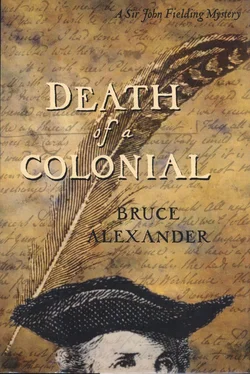Bruce Alexander - Death of a Colonial
Здесь есть возможность читать онлайн «Bruce Alexander - Death of a Colonial» весь текст электронной книги совершенно бесплатно (целиком полную версию без сокращений). В некоторых случаях можно слушать аудио, скачать через торрент в формате fb2 и присутствует краткое содержание. Год выпуска: 1999, ISBN: 1999, Издательство: Putnam Adult, Жанр: Исторический детектив, на английском языке. Описание произведения, (предисловие) а так же отзывы посетителей доступны на портале библиотеки ЛибКат.
- Название:Death of a Colonial
- Автор:
- Издательство:Putnam Adult
- Жанр:
- Год:1999
- ISBN:9780425177020
- Рейтинг книги:3 / 5. Голосов: 1
-
Избранное:Добавить в избранное
- Отзывы:
-
Ваша оценка:
- 60
- 1
- 2
- 3
- 4
- 5
Death of a Colonial: краткое содержание, описание и аннотация
Предлагаем к чтению аннотацию, описание, краткое содержание или предисловие (зависит от того, что написал сам автор книги «Death of a Colonial»). Если вы не нашли необходимую информацию о книге — напишите в комментариях, мы постараемся отыскать её.
Death of a Colonial — читать онлайн бесплатно полную книгу (весь текст) целиком
Ниже представлен текст книги, разбитый по страницам. Система сохранения места последней прочитанной страницы, позволяет с удобством читать онлайн бесплатно книгу «Death of a Colonial», без необходимости каждый раз заново искать на чём Вы остановились. Поставьте закладку, и сможете в любой момент перейти на страницу, на которой закончили чтение.
Интервал:
Закладка:
“What did you know of the Paltrow family and the last Lord Laningham at that time?”
“Nothing at all. Oh, I suppose I had heard the title bandied about some, yet I had no idea whether it was a dukedom, an earlship, or what it was. Nor did I know that Paltrow was the family name of the Laningham line. I have never taken interest in such matters. I had much to learn.”
“And you learned it well,” said Sir John with a respectful nod.
“I suppose I should thank you, yet if I had proved a little less conscientious as a scholar, I might not be in the position in which I find myself today. Mr. Bolt began my instruction on shipboard. He told me all he remembered of Lawrence Paltrow. I was especially interested in the Journal that he kept during their journey through the wilderness. It seemed to me that the man would have revealed himself through his writing. That might prove most beneficial. And so I asked Mr. Bolt if he knew what had become of it, and he became quite angry, though not at me — no, not quite. He would say only that the Journal had been lost when Mr. Paltrow drowned.”
At this point, Percival Mobley fell into a thoughtful silence, as if he were seeking to remember something — or perhaps weighing its importance. After a hesitation of nearly a minute, through which Sir John waited most patiently, he resumed his telling of his long tale.
“I should probably add at this point, Sir John, that all during the voyage, as we talked about the man I was to become, Mr. Bolt played constantly with a rope of woven leather that he seemed to keep with him at all times. He had it fixed in a loop and would constantly throw it round objects on the deck, doing tricks with it for the amusement of others aboard. I mention this only because it will become important later in the story.”
And to that, Sir John replied: “No doubt it does, and I have a good notion of just how. But tell me, how long after your arrival did you meet the man you were intended to see?”
“Oh, it was not long at all,” said he. “It must have been the day after we docked that I met the man who would become the director and financer of this enterprise.”
“And who was that man?”
“Why, it was the Solicitor-General — or, so that there be no confusion in the matter, it was Sir Patrick Spenser. “
Sir John took this startling information with equanimity. I, on the other hand, was so disturbed by what I had just heard that the pen with which I had been writing dropped from my hand, fluttering down to the floor and landing just beyond my foot. In my effort to scoop it up quickly, I knocked down the pile of paper upon which I had been writing and came ever so close to tipping the inkwell where I had dipped my pen. Reader, I was at once surprised and chagrined. The first thought that passed through my mind was not really a thought at all, but the repetition of those words in my mind’s ear, “That will be quite enough, Mr. Bolt” and “Come up here — now,” which I had heard during the night of my abduction. Why, yes, of course, it had been Sir Patrick’s voice, the same voice I had heard on that very night just outside the Globe and Anchor. Why had I not recognized it at that time, particularly after those hints dropped by Sir John? He, it was evident, had divined the answer by reason, by common sense, or by that extraordinary other sense which only he seemed to have. Yet now Sir John turned it all around and handed it back to Mobley.
“That is mere assertion,” said he. “You must convince me.”
“But how can I do that?”
“Let us begin with motive. What reason had he for backing you as claimant to the Laningham title and fortune? What was his plan?”
“That, at first, he was somewhat reluctant to reveal, but it gradually came forth that land was his object. Once my claim to the Laningham title had been recognized, it was his intention to strip the Laningham holdings one by one from the new Lord Laningham.”
“And how did he intend to do this?” Sir John put the question quite directly. There was naught of skepticism or mockery in his tone.
“Oh, by legal means, you may be sure of it,” said the other. “Sir Patrick is, after all, the Solicitor-General. As he had finally arranged it, the only laws broken would have been broken by me in gaining the title. The rest — the sale of lands and houses — was to be handled in full accordance with the law. Yet it was to be done at prices so low as to be legal theft.”
“What were you to be left?”
“Very little, in fact. In money, no more than the proceeds of the sales, such as they were, and perhaps a house — though not the Laningham castle; that he intended to give as a gift to the King as a residence for the Prince of Wales when the son reached his majority.”
“Ha! He would give the house, would he? How generous of him!” (I knew Sir John well enough to read the signs: He had begun to bristle.) “But tell me, Mr. Mobley, what would have happened if you had gained the title and simply refused to complete all or part of your side of the bargain? As it was, after all, the arrangement was not so favorable to you.”
“It did not take me long to understand that. I have participated in a good many matters of business in the colonies, enough certainly to know that in an arrangement such as this, it was I who took all the risks — and very grave risks they were. I should be better rewarded. I called this to his attention in a rather joking manner by asking if it were not to his advantage if we, between us, negotiated a contract. Then said he to me, ‘There is no need. We have a spoken contract between us.’ And said I to him, ‘What if I should break the contract?’ ‘You will not,’ said he, ‘for in coming to London you accepted the terms, and should you fail to execute them, I shall activate the enforcement clause.’ I then asked him what was the enforcement clause, and he said to me, ‘The enforcement clause is Mr. Bolt, and he will kill you.’”
“And did you then behave yourself? Or did you test the limits of that ‘spoken contract’?”
“No, I was perhaps bolder than I ought to have been. If you will recall, sir, I welcomed the opportunity to visit London, for it would at least give me a chance to visit my family in Southwark. We had left Baltimore in a great rush, yet I did have time to write my mother and father to inform them that I was coming. They must have known that I was in London, yet I was not permitted to visit them.”
‘’Not permitted?” echoed Sir John. “How, then, were you prevented?”
“I was near a prisoner in Sir Patrick Spenser’s residence in Grosvenor Square. While it was not specifically said that I might not leave unaccompanied, each time I sought to do so, Mr. Bolt was there to insist on coming along with me wherever I wished to go. Since I had no intention of bringing this rough, bearded pirate of a man into my family circle, I simply kept quiet about my wish, Sir Patrick insisted, in any case, that there was much work to be done, much to be learned about Lawrence Paltrow — and of course there was, particularly in the area of natural science, which, I was assured, Mr. Paltrow had known very well. I was expected to teach myself during a few short weeks in London all he had learned in years at Oxford. It became at last a bit too much for me, and I insisted upon a holiday from my studies. It was to take the form of a visit to the Drury Lane and attendance at one of Mr. Garricks productions of Shakespeare — Antony and Cleopatra it was.”
‘’Ah, yes,” said Sir John, ever the enthusiast of Shakespeare, ‘’an excellent play and a good lesson in history.”
‘’So it is,” agreed the other quite as eagerly. ‘’Would I could have seen it through to the end! “
Читать дальшеИнтервал:
Закладка:
Похожие книги на «Death of a Colonial»
Представляем Вашему вниманию похожие книги на «Death of a Colonial» списком для выбора. Мы отобрали схожую по названию и смыслу литературу в надежде предоставить читателям больше вариантов отыскать новые, интересные, ещё непрочитанные произведения.
Обсуждение, отзывы о книге «Death of a Colonial» и просто собственные мнения читателей. Оставьте ваши комментарии, напишите, что Вы думаете о произведении, его смысле или главных героях. Укажите что конкретно понравилось, а что нет, и почему Вы так считаете.












